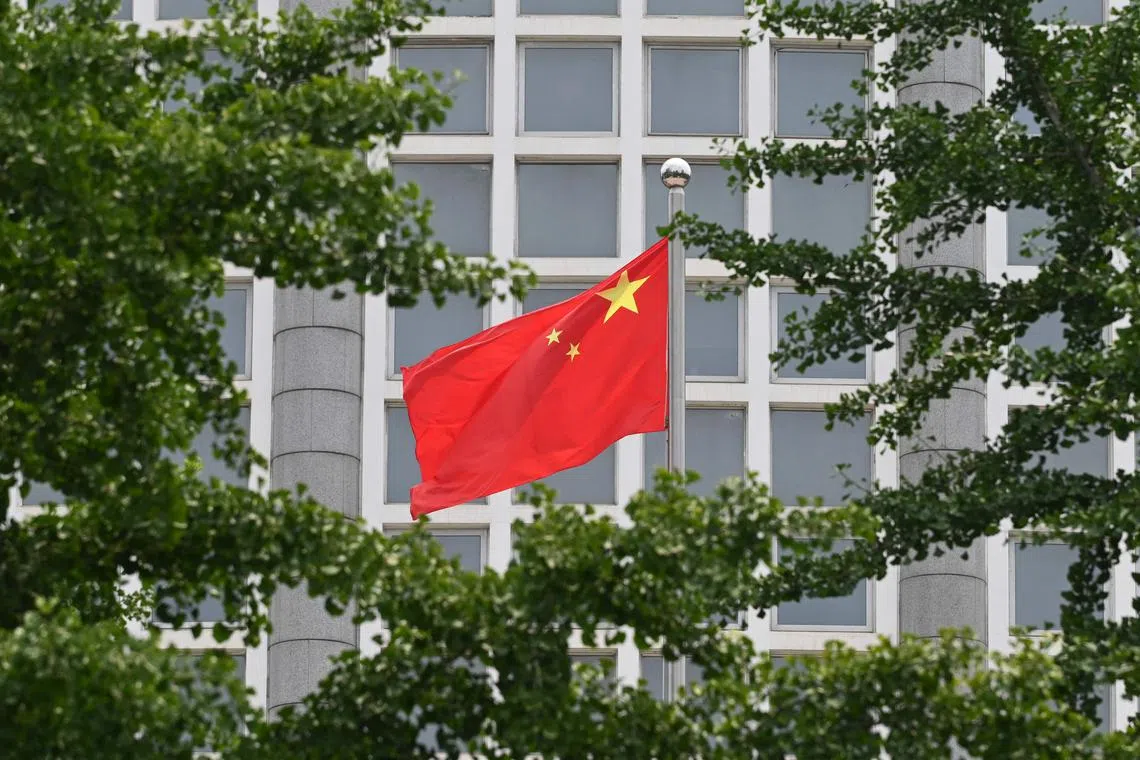Beijing passes law to hear lawsuits involving foreign states in Chinese courts
Sign up now: Get insights on Asia's fast-moving developments

The new law will take effect from 2024.
PHOTO: AFP
Follow topic:
BEIJING - China has passed a new law to deal with lawsuits involving foreign countries, marking a significant shift from its long-held view that states were immune from being sued or having their assets seized by foreign courts.
The adoption of the Foreign State Immunity Law on Sept 1 means that, in limited circumstances, Chinese courts can have jurisdiction over proceedings involving foreign countries and their property.
Experts said the new law, which takes effect from 2024, provides a basis for commercial disputes involving Chinese plaintiffs and foreign states but is unlikely to allow for increased litigation over political actions that foreign governments take against China.
According to the law, immunity will not apply in lawsuits involving commercial activities or labour contracts, for instance, and in certain compensation or arbitration cases involving foreign states.
But the law will not permit suits against the United States based on government actions such as sanctions against tech giant Huawei or investigations of Chinese-owned social media platform TikTok, said Professor William Dodge of the University of California, Davis.
“The restrictive theory that China has adopted preserves immunity for governmental actions,” said Prof Dodge, an international law expert.
The law puts China in line with most countries that take a restrictive view of state immunity, including the US, United Kingdom and Singapore. This means a foreign state is immune only when exercising sovereign power.
The law was first proposed by Chinese lawmakers in 2020 in response to lawsuits filed in the US over China’s alleged negligence in containing the Covid-19 virus.
Prof Dodge noted that a reciprocity provision in the new law allows China’s courts to grant less immunity when foreign courts do the same to China.
“If the US Congress were to amend US law to allow suits for damages based on Covid-19, then Chinese courts would be able to hear similar suits. At the moment, however, this is just a theoretical possibility.”
Still, Mr Ma Xinmin, a senior official at China’s Ministry of Foreign Affairs, said the law “provides a solid legal basis for China to take countermeasures” against discriminatory action by foreign courts in recent years, and can have a “preventive, warning and deterrent” effect.
Two adverse effects had resulted from the policy of absolute state immunity, he said, which meant that cases against foreign states or involving foreign state property were inadmissible.
First, Chinese citizens and businesses could not protect their rights and interests through Chinese courts when they had commercial disputes with foreign countries, he told Chinese broadcaster CCTV in a recent interview.
Second, some foreign courts had accepted and administered “false accusations and abuses” against China, but Chinese courts had no jurisdiction over foreign countries, creating an unequal situation.
Professor Henry Gao, who teaches Chinese law at the Singapore Management University, said that the law is part of China’s plan to “beef up the toolbox of international legal struggle” as urged by Chinese President Xi Jinping in a 2019 speech.
Mr Xi then called for the use of law “as a weapon to hold the highest grounds of the rule of law, and dare to say no to saboteurs and disruptors”.
Notably, a Foreign Relations Law that took effect in July was aimed at countering foreign “interference, sanctions and sabotage”. In June 2021, an Anti-Foreign Sanctions Law was passed to allow for countermeasures against those whom China perceives as harming its interests.
On the shift from the absolute immunity theory, Professor Donald Clarke from the George Washington University said that the Chinese are seeing that they can be hauled into court for their commercial activities in other countries. “(They) are wondering: Why are we giving a foreign country immunity that they do not give us?
“China has more confidence in its own legal system now and in the capacity of judges to hear these cases. I think now it is realising that it makes no sense to hang on to this very extreme concept of sovereignty and it’s only tying its own hands.”

